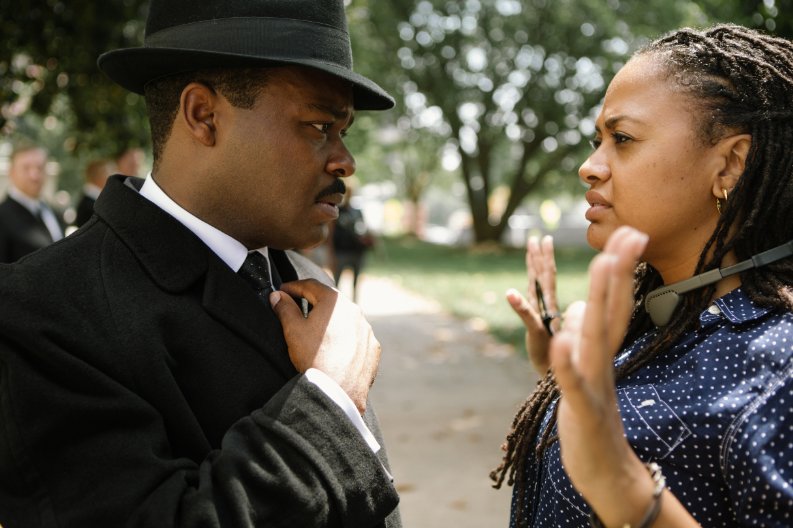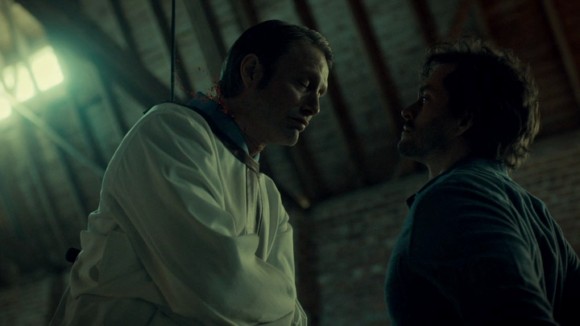The Giver
Written for the screen by Michael Mitnick and Robert B. Weide
Directed by Phillip Noyce
USA, 2014
The Giver doesn’t want people thinking too much about its heavier themes, so it answers any nagging questions with the Hollywood truism, “Love conquers all.” That’s fine… if the love story works. Sadly, this adaptation of Lois Lowry’s iconic novel focuses so much on the past that there’s no time to care about the present. Despite an interesting premise and some lovely visuals, a clunky script dooms The Giver to the ever-expanding list of tedious ‘young adult’ adaptations.
At its heart, The Giver is a story about the power of subjective memory. More specifically, how recollections from the past can influence our thoughts, emotions and actions in the future. Our young hero, Jonas (Brenton Thwaites), along with his best friends, Fiona (Odeya Rush) and Asher (Cameron Monaghan), live in a world bereft of memory. To ensure peace and harmony, their community requires a daily injection that eliminates distinctiveness among its citizens, including emotions, dreams and color vision. If a black and white world feels overly-metaphorical, that’s probably because it is. It’s the sort of heavy-handedness we’ve come to expect from YA adaptations. Jonas’ ability to actually see color is our first hint that he’s ‘different.’ In fact, it’s our only hint. The Giver tells us much, but shows precious little.
Similar to Divergent earlier this year, Jonas and all his pals are assigned a future vocation when they reach young adulthood by the creepy Chief Elder (Meryl Streep). Fiona (Odeya Rush) gets to be a caregiver because she can make babies shut up. Asher gets to be a drone pilot because the plot requires him to make a fateful (yet completely unbelievable) decision later in the film. Jonas really wins the jackpot, however, as he gets to be the new Receiver of Memories. That means he gets to train with The Giver (Jeff Bridges), who will impart all of his memories to Jonas in a series of abbreviated-to-the-point-of-being-almost-meaningless montages. As Jonas acquires memories, his emotions blossom, as does his love for Fiona. That they share only a few brief scenes together and generate the heat of an extinguished charcoal briquette is of little consequence. He loves her, dammit!
The foundation laid for an interesting film about the interconnections between memory, emotion and the delicate social fabric that holds us together, The Giver decides it’s had enough ‘next level’ nonsense and quickly descends into pointless melodrama. Jonas resolves to return the memories to his community so everyone can feel love again, even if that means feeling icky sometimes. He has no time to ponder the repercussions of ‘gifting’ people with emotions they’ve never experienced before. Never mind that he, himself, completely freaked out after having only one bad flashback; love is magic.
It’s almost as though screenwriters, Michael Mitnick and Robert B. Weide, can’t wait to diffuse any possible tension. Not only do they include a monotone (and unnecessary) narration from Thwaites, they tell the story from future tense, with Thwaites’ looking back at the action. This effectively eliminates any concerns about Jonas’ well-being before the film even starts. Worse still, we get only fleeting moments of meaningful interaction between the characters. The Giver is simply too packed with mythology and exposition to fuss over character development. We feel no sense of urgency about what’s happening, which forces the writers to take drastic measures as the film progresses, including euthanasia and the specter of cold-blooded murder. These feel like desperate attempts to steal some dramatic tension that the script has failed to earn.
Director, Phillip Noyce, fares somewhat better. His pacing and visual storytelling are apt throughout. He creates a convincing world with carefully painted boundaries that keep the memories out and the secrets in. There are also some delicious Expressionistic touches. When Jonas cautiously walks down a vertiginous hallway, you aren’t sure who he’ll find on the other side of the door; The Giver or Dr. Caligari. Still, Noyce’s steady hand can’t overcome a script that probably needed a more unorthodox style to hide its inadequacies.
Judging by their recent adaptations, it’s abundantly clear that Hollywood believes young adult audiences are incapable and/or unwilling to tackle the vagaries of genuine human emotion; that their search for meaning is limited to queasy melodrama and platitudes about the infallibility of love. Fantasy fulfillment is one of the great pleasures of cinema, but euthanasia and dystopian nightmares should be more than fancy plot points. Otherwise, movies like The Giver are just fancy injections to numb our thoughts and emotions. Filmmakers need to start respecting younger audiences by giving them the challenging and sophisticated films that they deserve.
Thus endeth the sermon.
— J.R. Kinnard








